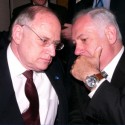Major Arab states like Egypt, Jordan and Saudi Arabia have lost confidence in the White House, and now look to Israel as their best hope for confronting existential threats from Iran, Malcolm Hoenlein, Executive Vice Chairman of the Conference of Presidents of Major American Jewish Organizations, said last week.
In an interview with John Catsimatidis on the “Cats Roundtable” radio program on AM 970, Hoenlein described a developing alliance among Israel, Jordan, Egypt and Saudi Arabia from personal experience. “I have been to these Arab countries, and all you hear there is that ‘Israel’s our hope.’ That they want Israel to do what has to be done. They have very little confidence in the West,” he stated.
“The Egyptians even have proposed now a joint Arab force – because they don’t have confidence that the West will stand up to the threats,” Hoelien continued. “They see in Syria the ineffectiveness of the West to stop the aggressiveness of ISIS, or of the Iranians and the Muslim Brotherhood. In fact, some see the West as abetting these groups.”
Hoenlein further expressed concern whether the United States would follow up on its commitment to support Israel in face of the ongoing threats. “There was a report that the United States had said they would knock Israeli planes out of the air if they tried to attack Iran. The White House has strenuously denied those reports,” he said. “But the question of whether they [the Obama Administration] would cooperate, whether they would give the support, or do it themselves, is a critical question for which, frankly, I don’t know the answer.”
The top Jewish leader also defended Israeli Prime Minister’s speech to a joint session of Congress last Tuesday. “The purpose of it [Netanyahu’s speech] was not to negotiate a deal. It was to sound an alarm,” Hoenlein asserted. “The polls show now that 85% of Americans see Iran as a threat. Two-thirds [are] even willing to support military actions if nothing else works to stop them.”
He added that “the reaction to his [Netanyahu’s] speech was overwhelmingly positive.” While people can disagree with the process of the Boehner invitation, “that’s a sideshow to the primary challenge of our time,” he said. “And that is Iran as it is today – a conventional power – and how much more that would be compounded were it to be a nuclear power.”

